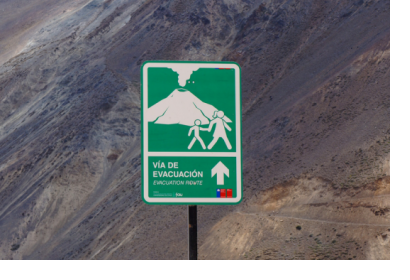The RIESGOS project (Spanish for “risks”) is an initiative from the German Aerospace Center (Deutsches Zentrum für Luft- und Raumfahrt; DLR) and other project partners to develop a multi-risk information system. The purpose of this project is to improve the information base for natural disaster management and develop strategies to avoid or mitigate risks. This will improve the understanding of risks and predict interdependencies during major emergencies. A prototype of the system is being developed for the Andean region in Chile, Ecuador and Peru.
The hazards connected to natural disasters are not only mutually dependant, but also can lead to cascading effects. The Andean region is at high risk of natural disasters and any cascade effect would be devastating. For this reason a new system is now being developed until the end of 2020. Around 40 national and international research institutions, government agencies and companies are bringing in their expertise. The project is funded by the German Federal Ministry of Education and Research (BMBF).
Scenarios like flood, landslides, volcanic eruptions, earthquakes, tsunamis and their mutual dependencies are situations the RIESGOS project teams are working from the perspective of “what would happen if…?” To extend local analysis areas to a regional and national level, researchers from a variety of disciplines are using a broad range of data, high-resolution optical remote sensing and radar data.
The work in Germany is being developed through a close cooperation with the South American partners, whose experience in the management of natural disasters ensure the RIESGOS project is practice-oriented and takes into consideration needs on the ground.
The RIESGOS project consortium comprises the following academic research institutions and industrial partners: the German Aerospace Center (DLR), the German Research Centre for Geosciences (GFZ), the Alfred Wegener Institute (AWI), The Technical University of Munich, 52°North, geomer GmbH, EOMAP GmbH & Co. KG, plan + risk consult, DIALOGIK. The following associated partners support the project: GIZ, UNOOSA /UN-SPIDER, UNESCO and MunichRE. RIESGOS is already cooperating with more than 25 research partners and government agencies in the South American partner countries of Chile, Ecuador and Peru, and plans to expand this collaboration over the course of the project.

